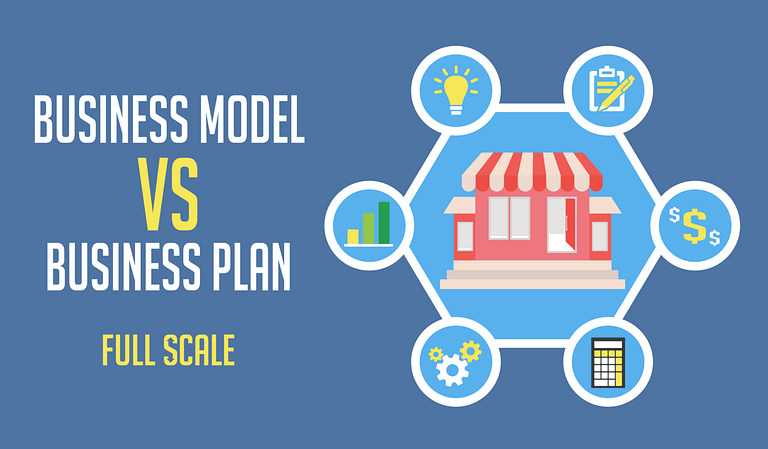There’s a big misconception about the whole business model vs. business plan debate because both terms have been wrongly used. Today, we’ll look into what they’re really for and why they’re needed for the business.
Strategy has always been a building block of business. In the ever-competitive and highly volatile industry, you have to come up with a sustainable advantage over your competitors. Few lucky entrepreneurs successfully start on the right foot, but luck often runs out while keeping a great momentum. This is where a solid business strategy comes to play.
You can’t just launch your startup without establishing where it’s heading. You need a business strategy to identify which direction you’ll operate towards. This is why a business plan and a business model are essential factors in a company’s success. But because they seemingly have a similar purpose, they’re mistakenly used interchangeably. The truth is, one cannot exist without the other.
To truly understand the difference between a business model vs. a business plan, we’ll need to define what they are and what they’re used for.
What is a Business Model?
A business model is the company’s rationale and plans for making a profit. It explains how a company delivers value to its customers at a specific cost. A business model would include details about the company’s products and services, its target market, and all expenses related to the operations and production.
Why is it necessary?
It’s considered a roadmap for a business to achieve its financial goal in a given period. It maps out how you can sustain the value you deliver to your customers. Entrepreneurs use it as a tool to study, test, and estimate cost and revenue streams.
They can make quick hypothetical changes to the business model to determine how a financial decision can impact their long-term operations. This allows business owners to anticipate and adapt to trends and challenges in their industry.
Consequently, a strong business model also helps attract investors, recruit talent, and motivate employees. The management and staff are often motivated by how well a company adheres to the business model.
Types of Business Model
When it comes to different kinds of business models, there are several options for a company. For example, a software company might go with a subscription model because it’s easier to sell their product through a license subscription. On the other hand, retail companies might go for the accessories model because it’s more straightforward.
In determining which type of business model to use, companies choose the style that best suits their operations and industry. A growing method is using a combination of business models to create a hybrid system for the business.
The following are some of the most widely used types of business models:
- Subscription
- Transactional
- Freemium
- Affiliate
- Retail sales
Creating a Business Model
Now that we’ve established what a business model is, it’s time to learn how to create one for your startup. Your business model has to answer all the critical questions about your business.
Here are the key components you must include in your business model:
- Vision
- Key Objectives
- Target Market
- Problem
- Solution
- Product Value
- Product Pricing
- Marketing
- Required Funding
- Growth Opportunity
Keep in mind, the business model has to be updated regularly to fit your goals. All companies undergo a stage of maturity that directly affects the business model it follows.
For early-stage startups, the business model would ideally be simple and straightforward. Most business owners would even opt for a flat organization where staff could communicate their concerns directly to the owner. This, of course, will change as the company expands.
Now that we’ve learned what a business model is, it’s time to move on to the next part of the business model vs. business plan discussion. So, let’s discuss what is a business plan.
What is a Business Plan?
A business plan is a written document that details a company’s goals and its strategies to achieve them. It’s considered the “blueprint of the business” because it summarizes all the essential aspects of the company such as finance, marketing, and operations.
Why is it necessary?
It serves as a reference for the company owner and the management in making major business decisions. It can also be presented to investors when the owner is raising capital. It’s beneficial for startups who have no proven track record since a business plan can pitch its full potential.
A business plan is not only helpful to a business in its early stage, but it also helps it pivot during unforeseen circumstances. In a volatile industry, a company needs to adapt quickly and efficiently. Hence, update the goals and methods should accordingly.
Creating a Business Plan
So, what should a business plan include?
Business plans vary according to industry, but there is a general format for writing a business plan. You can expand or shorten this template based on long-term goals.
- Executive Summary
- Business Description
- Market Analysis
- Product Development
- Marketing Strategies
- Operations and Management
- Financial Plans
You can choose from a wide selection of business plan templates when it comes to the actual writing. Remember to keep it concise and avoid jargon in the content. You will present your business plans to investors and stakeholders; hence, they need to get a clear idea of it in one reading.
Business Model vs. Business Plan: How to Use Them
At this point, we’ve established that both a business model and a business plan are essential to success. However, both can only take your business so far. How well you execute and follow them is a whole other story. It’s challenging to start a startup, let alone maintain it.
If you want to avoid common startup mistakes, you need to build your business on a strong foundation. Hire the best people, invest in reliable tools, and sign up for mentoring.
Speaking of mentors, Full Scale founders Matt DeCoursey and Matt Watson are incredibly passionate about helping entrepreneurs succeed. They’ve created Full Scale to assist startup owners in launching and managing their companies.
Full Scale is an offshore software development company that offers a wide array of services for startups. We offer the best talent and resources needed to begin your entrepreneurial journey.
We have seasoned project managers, marketing specialists, and technology experts at your service. We’ll take care of all the hassles out of your daily operations so you can focus on your core competencies.
Want to learn more about Full Scale? Get your FREE consultation today!



